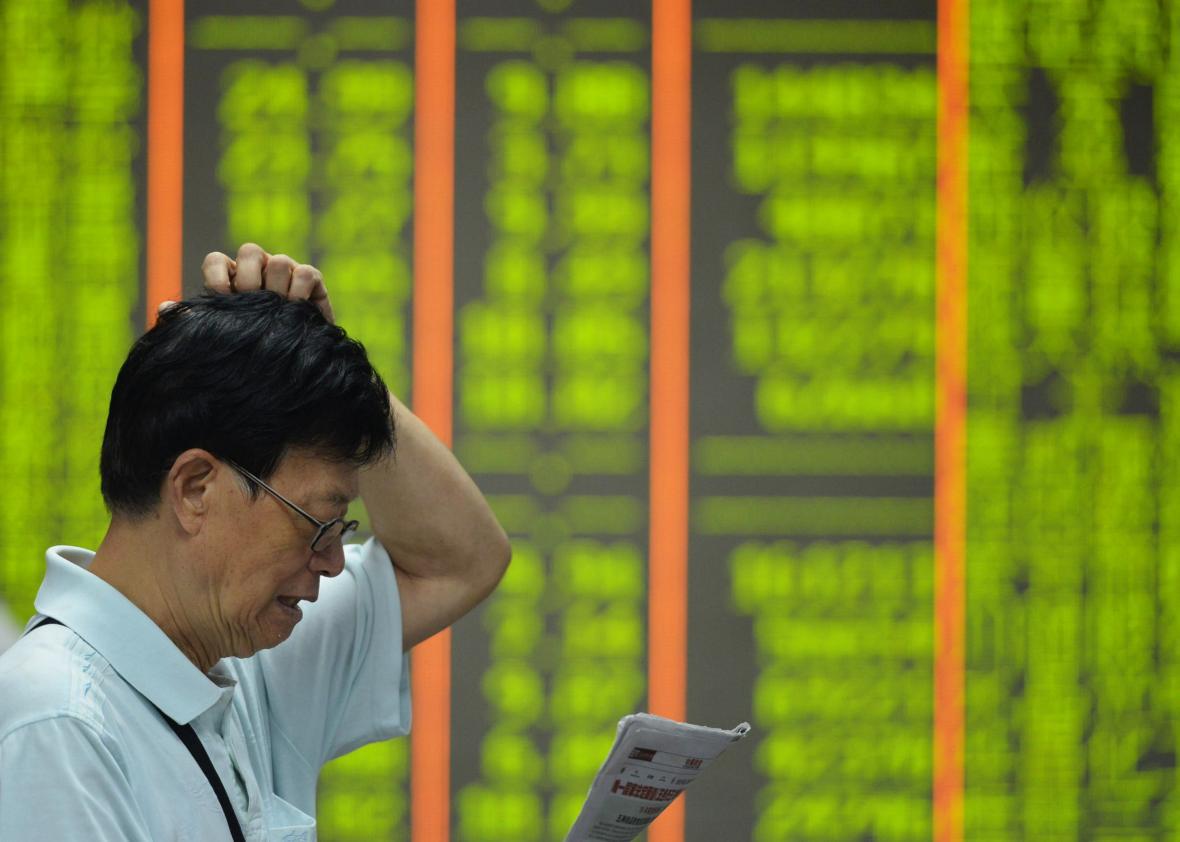China’s “black Monday,” the Shanghai Composite’s largest fall since 2007, is being felt around the world today—from a tumble in the Dow Jones, to a drop in oil prices, to an alarming crash of the South African rand—as investors weigh fears that the Chinese economic downturn may be worse than originally feared.
All of this highlights the paradox of international competition in an era of economic interdependence: Americans may be alarmed by Beijing’s economic and political rise and know-nothing, populist presidential candidates can count on easy applause for pledges to “beat China,” but when China actually does take a tumble, Americans feel it in their pocketbooks and portfolios. China’s economy has proved its critics wrong before, but if the country is in for a prolonged downturn, Americans—and everyone else, for that matter—have good reason to worry.
The latest economic distress is happening at the same time as heightened geopolitical tensions involving Beijing. The U.S. is becoming increasingly assertive in challenging China’s activities in the South China Sea, which have alarmed its southern neighbors. And China has been ramping up its World War II-themed patriotic displays in what seems like an attempt to needle Japan’s nationalist Prime Minister Shinzo Abe at a time when he’s pushing changes to his own country’s pacifist World War II-era constitution. Escalating tensions on the Korean Peninsula also threaten to drive a wedge between South Korea and China, which is the South’s largest trading partner but also the North’s only significant ally.
These ongoing tensions are worrying enough in normal times, but are even more dangerous when China’s leaders feel insecure and challenged by domestic enemies. Which is how they must feel right now. The economic turmoil of the past few weeks has dealt a blow to the image of China’s leaders as competent stewards of the country’s economic rise, and President Xi Jinping looks powerless in the face of economic forces. Reports are already emerging about grumbling within senior ranks of the Communist Party over whether Xi and his advisers are up to the task of managing China’s next economic transition. If Xi feels threatened by a lack of support at home, he could ramp up his purge of potential rivals.
The bigger fear if there’s a long-turn economic downturn is social instability. Under the country’s unspoken post-Tiananmen grand bargain, China’s population hasn’t significantly challenged the autocratic one-party state, so long as the party continues to deliver economic progress and increasing prosperity. This is not to say that Chinese society is entirely harmonious—while the authorities have been adept at managing dissent, the country still sees tens of thousands of “mass incidents” every year, sparked by causes ranging from labor disputes, to environmental degradation, to land seizures. But thanks to steady growth, public anger over economic conditions hasn’t been a major problem over the last 25 years. It could be soon: Chinese investors, who were strongly encouraged by the state-run media to put money in the market during the country’s boom, are already venting their anger online.
In this context, an international conflict stoking nationalist sentiment, and taking heat away from the country’s senior leaders, could look awfully appealing to Xi and his team. The Chinese government has a somewhat complex history with nationalism: Nationalist protests, like the anti-Japanese demonstrations that took place throughout China, occasionally becoming violent in 2012, are covered in the Chinese media and are a rare form of “anti-government” dissent tolerated by the authorities. (They’re “anti-government” to the extent that they want the government to be more assertive in challenging Japan or another foreign target.) Chinese nationalism benefits the state to a certain extent, but public opinion is probably more hawkish than that of the elites when it comes to military confrontation. If regional tensions with either Japan or southern neighbors like Vietnam or the Philippines rise at a time of economic distress, Xi’s government will have even more incentive to allow the public to vent its anger at a foreign target, as well as more incentive to stoke that anger by ramping up tensions.
Xi certainly wouldn’t be the first leader to use nationalism and international tensions to deflect attention from domestic economic distress: Just look at Russia. Unfortunately, the risks of a major conflict drawing in multiple countries, including possibly the United States, are greater in East Asia than in Eastern Europe.
So, as alarming as many Americans may have found China’s rise to global power, a world with a China that feels uncertain and threatened is a lot more dangerous.
